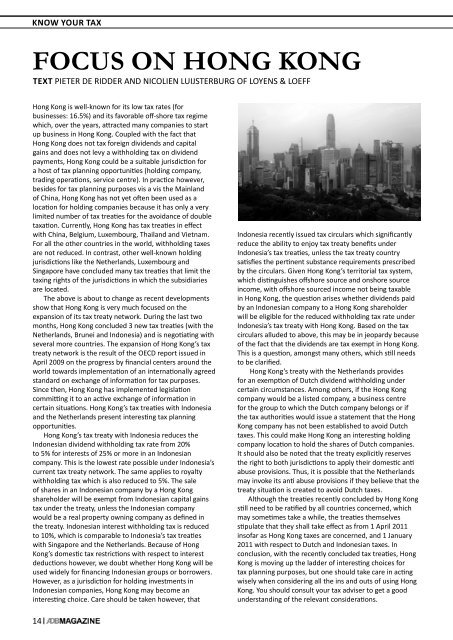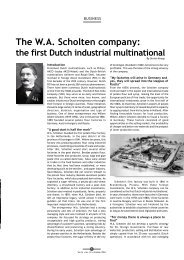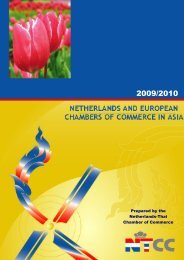May 2010 - Association of Dutch Businessmen
May 2010 - Association of Dutch Businessmen
May 2010 - Association of Dutch Businessmen
Create successful ePaper yourself
Turn your PDF publications into a flip-book with our unique Google optimized e-Paper software.
know your tax<br />
Focus on Hong Kong<br />
Text Pieter de Ridder and Nicolien Luijsterburg <strong>of</strong> Loyens & Loeff<br />
Hong Kong is well-known for its low tax rates (for<br />
businesses: 16.5%) and its favorable <strong>of</strong>f-shore tax regime<br />
which, over the years, attracted many companies to start<br />
up business in Hong Kong. Coupled with the fact that<br />
Hong Kong does not tax foreign dividends and capital<br />
gains and does not levy a withholding tax on dividend<br />
payments, Hong Kong could be a suitable jurisdiction for<br />
a host <strong>of</strong> tax planning opportunities (holding company,<br />
trading operations, service centre). In practice however,<br />
besides for tax planning purposes vis a vis the Mainland<br />
<strong>of</strong> China, Hong Kong has not yet <strong>of</strong>ten been used as a<br />
location for holding companies because it has only a very<br />
limited number <strong>of</strong> tax treaties for the avoidance <strong>of</strong> double<br />
taxation. Currently, Hong Kong has tax treaties in effect<br />
with China, Belgium, Luxembourg, Thailand and Vietnam.<br />
For all the other countries in the world, withholding taxes<br />
are not reduced. In contrast, other well-known holding<br />
jurisdictions like the Netherlands, Luxembourg and<br />
Singapore have concluded many tax treaties that limit the<br />
taxing rights <strong>of</strong> the jurisdictions in which the subsidiaries<br />
are located.<br />
The above is about to change as recent developments<br />
show that Hong Kong is very much focused on the<br />
expansion <strong>of</strong> its tax treaty network. During the last two<br />
months, Hong Kong concluded 3 new tax treaties (with the<br />
Netherlands, Brunei and Indonesia) and is negotiating with<br />
several more countries. The expansion <strong>of</strong> Hong Kong’s tax<br />
treaty network is the result <strong>of</strong> the OECD report issued in<br />
April 2009 on the progress by financial centers around the<br />
world towards implementation <strong>of</strong> an internationally agreed<br />
standard on exchange <strong>of</strong> information for tax purposes.<br />
Since then, Hong Kong has implemented legislation<br />
committing it to an active exchange <strong>of</strong> information in<br />
certain situations. Hong Kong’s tax treaties with Indonesia<br />
and the Netherlands present interesting tax planning<br />
opportunities.<br />
Hong Kong’s tax treaty with Indonesia reduces the<br />
Indonesian dividend withholding tax rate from 20%<br />
to 5% for interests <strong>of</strong> 25% or more in an Indonesian<br />
company. This is the lowest rate possible under Indonesia’s<br />
current tax treaty network. The same applies to royalty<br />
withholding tax which is also reduced to 5%. The sale<br />
<strong>of</strong> shares in an Indonesian company by a Hong Kong<br />
shareholder will be exempt from Indonesian capital gains<br />
tax under the treaty, unless the Indonesian company<br />
would be a real property owning company as defined in<br />
the treaty. Indonesian interest withholding tax is reduced<br />
to 10%, which is comparable to Indonesia’s tax treaties<br />
with Singapore and the Netherlands. Because <strong>of</strong> Hong<br />
Kong’s domestic tax restrictions with respect to interest<br />
deductions however, we doubt whether Hong Kong will be<br />
used widely for financing Indonesian groups or borrowers.<br />
However, as a jurisdiction for holding investments in<br />
Indonesian companies, Hong Kong may become an<br />
interesting choice. Care should be taken however, that<br />
Indonesia recently issued tax circulars which significantly<br />
reduce the ability to enjoy tax treaty benefits under<br />
Indonesia’s tax treaties, unless the tax treaty country<br />
satisfies the pertinent substance requirements prescribed<br />
by the circulars. Given Hong Kong’s territorial tax system,<br />
which distinguishes <strong>of</strong>fshore source and onshore source<br />
income, with <strong>of</strong>fshore sourced income not being taxable<br />
in Hong Kong, the question arises whether dividends paid<br />
by an Indonesian company to a Hong Kong shareholder<br />
will be eligible for the reduced withholding tax rate under<br />
Indonesia’s tax treaty with Hong Kong. Based on the tax<br />
circulars alluded to above, this may be in jeopardy because<br />
<strong>of</strong> the fact that the dividends are tax exempt in Hong Kong.<br />
This is a question, amongst many others, which still needs<br />
to be clarified.<br />
Hong Kong’s treaty with the Netherlands provides<br />
for an exemption <strong>of</strong> <strong>Dutch</strong> dividend withholding under<br />
certain circumstances. Among others, if the Hong Kong<br />
company would be a listed company, a business centre<br />
for the group to which the <strong>Dutch</strong> company belongs or if<br />
the tax authorities would issue a statement that the Hong<br />
Kong company has not been established to avoid <strong>Dutch</strong><br />
taxes. This could make Hong Kong an interesting holding<br />
company location to hold the shares <strong>of</strong> <strong>Dutch</strong> companies.<br />
It should also be noted that the treaty explicitly reserves<br />
the right to both jurisdictions to apply their domestic anti<br />
abuse provisions. Thus, it is possible that the Netherlands<br />
may invoke its anti abuse provisions if they believe that the<br />
treaty situation is created to avoid <strong>Dutch</strong> taxes.<br />
Although the treaties recently concluded by Hong Kong<br />
still need to be ratified by all countries concerned, which<br />
may sometimes take a while, the treaties themselves<br />
stipulate that they shall take effect as from 1 April 2011<br />
ins<strong>of</strong>ar as Hong Kong taxes are concerned, and 1 January<br />
2011 with respect to <strong>Dutch</strong> and Indonesian taxes. In<br />
conclusion, with the recently concluded tax treaties, Hong<br />
Kong is moving up the ladder <strong>of</strong> interesting choices for<br />
tax planning purposes, but one should take care in acting<br />
wisely when considering all the ins and outs <strong>of</strong> using Hong<br />
Kong. You should consult your tax adviser to get a good<br />
understanding <strong>of</strong> the relevant considerations.<br />
14















